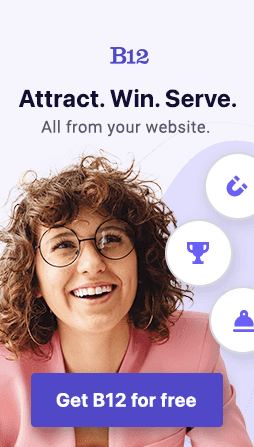Build an AI website in 60 seconds
AI generates your personalized website instantly with built-in scheduling, payments, email marketing, and more.
Start for free
The most impactful marketing ideas for small businesses

As a small business owner, you understand the importance of marketing your products and services. There are many marketing strategies available. But only a few will prove to be impactful for your business. In this blog post, we'll explore the most effective marketing ideas. These ideas will assist you in growing your small business. Whether you're looking to drive traffic to your website, boost your social media presence, or increase your sales, we've got you covered.
Marketing strategies
Effective marketing strategies help small businesses stand out and attract customers. Marketing not only generates leads and drives sales, but it also establishes your brand's identity and builds trust among your target audience.
Importance of small business marketing
Marketing is a crucial factor for small business success. Without a marketing strategy, small businesses can struggle to generate brand awareness and attract new customers in today's crowded marketplace. A strong marketing plan can differentiate your business from competitors, establish your brand identity, and build customer loyalty. Marketing helps small businesses to target the right audience and convey their value propositions effectively. It helps small businesses reach new customers and keep their existing customers engaged.
Overview of the most impactful marketing ideas
Small businesses can utilize a multitude of marketing strategies to promote their products and services and grow their customer base. Some of the most impactful marketing ideas include social media marketing, digital marketing, advertising, and customer service. Social media marketing is essential for any small business today, primarily because it offers a cost-effective way to reach and engage potential customers.
In contrast, digital marketing helps small businesses to explore new avenues and promote their brand through various channels, such as email marketing and mobile optimization. Advertising remains a necessary element of marketing for small businesses to reach a broader audience. Finally, excellent customer service is crucial in building a loyal customer base.
Building a strong marketing strategy
Defining your target audience and buyer personas
One of the most important aspects of creating a successful marketing strategy is understanding your target audience. By defining your target audience and buyer personas, you can create content and campaigns that resonate with their needs and interests. To do so, you can conduct surveys, analyze demographics and psychographics, and research their behaviors and preferences.
Identifying your unique selling proposition
To stand out in a crowded market, you need to identify your unique selling proposition (USP). Your USP is what makes your business unique and different from your competitors. It can be your product quality, customer service, pricing strategy, or any other feature that sets you apart. By identifying your USP, you can focus your marketing efforts on highlighting it and communicating its value to your target audience.
Outlining the marketing mix (product, price, place, promotion)
The marketing mix is a framework that helps you organize and coordinate your marketing efforts. It consists of four elements: product, price, place, and promotion. By outlining these four elements, you can ensure that you are delivering the right product, at the right price, through the right channels, and with the right messaging. For example, you can use pricing strategies like bundling, discounting, or value-based pricing to capture different segments of your target audience.
Conducting a SWOT analysis
Before creating your marketing strategy, it's essential to conduct a SWOT analysis. SWOT stands for Strengths, Weaknesses, Opportunities, and Threats, and it helps you identify the internal and external factors that affect your business. By identifying your strengths and weaknesses, you can determine what areas you need to improve and what areas you can leverage. By analyzing your opportunities and threats, you can anticipate changes in the market and adjust your strategy accordingly.
Developing a comprehensive social media marketing plan
By harnessing the power of social media platforms, businesses can effectively engage with their audiences, increase brand awareness, and drive conversions. Below are the steps involved in developing a comprehensive social media marketing plan.
Setting SMART goals
The first step in creating a successful social media marketing plan is to set SMART (specific, measurable, achievable, relevant, and timely) goals. SMART goals allow businesses to track their progress and measure their success. For example, a SMART goal for a life coach might be to increase their client base by 25% within the next six months.
Selecting the right social media platforms
Businesses need to select the social media platforms that are most relevant to their target audience. For example, if the majority of your customers are millennials, you may want to focus on Instagram and TikTok. On the other hand, if you primarily target baby boomers, you may want to focus on Facebook. By selecting the right platforms, businesses can maximize their social media marketing efforts and reach their target audience effectively.
Creating engaging content
Creating engaging content is crucial for driving engagement and conversions on social media. Businesses should create content that aligns with their brand messaging and resonates with their target audience. For an architect, this could mean creating visually stunning images of their projects. By creating engaging content, businesses can effectively build relationships with their customers and increase brand loyalty.
Analyzing and measuring performance metrics
The final step in developing a comprehensive social media marketing plan is to analyze and measure performance metrics. Businesses should track key metrics such as engagement rates, reach, and conversion rates to determine the success of their social media marketing efforts. By analyzing performance metrics, businesses can identify what's working and what's not, and adjust their strategy accordingly.
Leveraging digital marketing strategies
Digital marketing allows small businesses to target a specific audience, track their results, and adjust their campaigns accordingly. Here are some of the most impactful digital marketing strategies that small businesses can use to drive growth.
Search engine optimization (SEO)
Search engine optimization is the process of optimizing your website to rank higher on search engine results pages (SERPs). By optimizing your website's content, structure, and architecture to meet the requirements of search engines, you can improve your visibility on SERPs and attract more potential customers to your site.
Pay-Per-Click (PPC) advertising
Pay-per-click advertising is a digital marketing model in which advertisers pay a fee each time one of their ads is clicked. This type of advertising is particularly effective for small businesses as it allows them to target their desired audience and set their budget appropriately. With PPC advertising, small businesses can also track their campaigns' performance, allowing them to optimize their campaigns for better results.
Email marketing
Email marketing is a cost-effective digital marketing strategy that involves sending promotional messages to a group of subscribers via email. With email marketing, small businesses can cultivate personal relationships with their customers, build brand awareness, and generate more leads and sales. By providing valuable content and being consistent with sending emails, small businesses can deliver high-performing campaigns with email marketing.
Mobile optimization
More and more consumers are accessing the internet using their mobile devices. As a result, small businesses need to ensure that their website is optimized for mobile devices to maximize their customers' user experience. A well-designed mobile website is essential for small businesses to drive more traffic to their site and improve their search engine ranking. It is also effective to make mobile optimization part of your customer service strategy to provide your customers with easy access to your products or services.
By implementing the above strategies, businesses can extend their reach to customers, increase their revenues, and achieve their desired growth. Small businesses should strive to incorporate these digital marketing strategies in their overall marketing plans to create impactful and robust campaigns.
Creative and low-cost marketing ideas
As a small business owner, it can be challenging to come up with effective marketing strategies that won't break the bank. Luckily, there are many creative and low-cost marketing ideas that you can employ to get the word out about your business.
Collaborating with other businesses
Collaborating with other businesses in your community is a great way to get exposure and build relationships. Try reaching out to complementary businesses and propose joint marketing efforts.
Participating in local events
Participating in local events is a great way to get in front of potential customers. Consider sponsoring or setting up a booth at a community fair or festival. You could also host your own events, such as a workshop or fundraiser, and invite the community to attend.
Building referral programs
Referral programs can be a powerful tool for small businesses. Encourage your customers to refer their friends and family by offering a discount or other incentives. You could also partner with complementary businesses to offer joint referral programs.
Offering discounts and promotions
Offering discounts and promotions can be a great way to attract new customers and retain existing ones. Consider offering a discount to first-time customers or running a limited-time promotion on a popular product or service. Be sure to promote your discounts and promotions on social media and your website to get the word out.
Experiment with these marketing ideas to see which ones work best for your business and don't be afraid to try new tactics. With persistence and creativity, you can build a successful marketing strategy for your small business.
Final thoughts
Small businesses face unique marketing challenges, but there are effective marketing ideas that can make a significant impact on growth.
The most impactful marketing ideas that you can adopt to grow your business include building a comprehensive marketing strategy, leveraging social media channels, digital marketing, and creative marketing ideas. It's important to note that each of these strategies should be tailored to your business and goals.
One of the most important tips for small businesses is to regularly monitor and analyze performance metrics. This will help you identify what's working and what's not, so you can optimize your marketing efforts for maximum impact. Additionally, be sure to create engaging and valuable content that resonates with your target audience.
Lastly, we encourage local business owners to take action on the marketing ideas presented in this post. Implement these strategies one at a time, and measure their performance to identify which ones work best for your business. Remember, marketing is an ongoing process, and it takes time and effort to see the results. Stay consistent, and don't give up. With the right mix of marketing strategies, you'll be on your way to growing your business and achieving success.
Build a solid online presence to boost your marketing efforts with B12
An effective marketing strategy should involve building a solid online presence. Through a professional website, you can make your services more visible to potential clients. You can introduce your business and increase brand awareness.
Use B12 to establish your small business online and get everything you need to sell services. With B12, you can launch a high-quality website that can help you engage and nurture leads. Get started today for free in 60 seconds.
Attract, win, and serve more clients
Receive helpful resources directly to your inbox to help you succeed online.
Draft your site in 60 seconds
Get an AI website made specifically for you that's free to launch.
Start for free ✨No credit card required
Spend less time on your website and more time growing your business
Let B12 set up your professional online presence with everything you need to attract, win, and serve clients.





